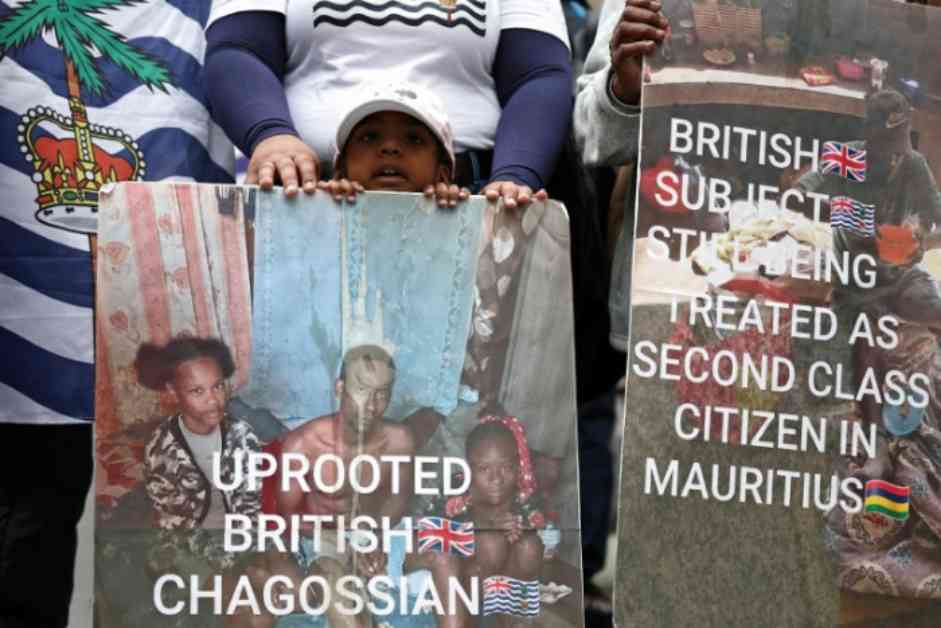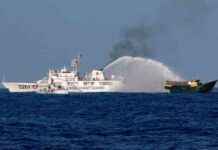Article:
Members of the Chagossian community and supporters protested outside the High Court as a hearing into the fate of the Chagos Islands went on inside. (Photo: AFP)
London — A British court on Thursday paved the way for a government deal on returning the remote Chagos Islands to Mauritius, lifting a temporary ban that had forced an 11th-hour halt to an accord being signed. The agreement would see Britain hand back the Indian Ocean archipelago to its former colony and pay to lease a key US-UK military base on Diego Garcia, the largest island.
Labour Prime Minister Keir Starmer had been due to conclude the agreement in a virtual signing ceremony with Mauritian representatives earlier on Thursday. But in a last-minute pre-dawn court hearing, two Chagossian women won a temporary injunction from London’s High Court on the deal’s progress, in an embarrassing turn of events for Starmer whose government has faced huge criticism over the plan.
After a hearing at 10.30am (0930GMT), Judge Martin Chamberlain lifted the injunction, saying there was a “very strong case” that the UK national interest and public interest would be “prejudiced” by extending the ban. He said any further challenges would have to be heard by the Court of Appeal.
Criticism and Support
A government spokesman said “we welcome the judge’s ruling today”. But the opposition Conservatives have slammed the government’s Chagos Island deal as “British sovereign territory being given away” in a “bad deal” for the United Kingdom. Earlier, the two Chagossian women, Bernadette Dugasse and Bertrice Pompe applied for the injunction after a leaked newspaper report late on Wednesday indicated the government planned to unveil the deal.
As around 50 protesters gathered outside the court, the two women’s lawyer, Philip Rule, alleged the government was acting “unlawfully” and argued there was “significant risk” that Thursday could be the last opportunity for the court had to hear the case. But Starmer has said that international legal rulings have put Britain’s ownership of the Chagos in doubt and only a deal with Mauritius can guarantee that the base remains functional.
The base on Diego Garcia is leased to the United States and has become one of its key military facilities in the Asia-Pacific region, including being used as a hub for long-range bombers and ships during the wars in Afghanistan and Iraq.
Political Fallout
“The deal is the right thing to protect the British people and our national security,” a government spokesperson told Agence France-Presse (AFP) ahead of the ruling. The opposition Conservatives, however, described the deal as a “sellout for British interests”. “You’re seeing British sovereign territory being given away to an ally of China, and billions of pounds of British taxpayers’ money being spent for the privilege,” said senior Tory politician Robert Jenrick. “This was always a bad deal,” he added.
Britain kept control of the Chagos Islands after Mauritius gained independence in the 1960s. But it evicted thousands of Chagos islanders who have since mounted a series of legal claims for compensation in British courts. In 2019, the International Court of Justice recommended that Britain hand the archipelago to Mauritius after decades of legal battles.
The deal would give Britain a 99-year lease of the base, with the option to extend. The UK government has not said how much the lease will cost, but has not denied reports that it would be £90 million (US$111 million) a year. Mauritian Prime Minister Navin Ramgoolam has said his country would pursue its fight for full sovereignty over the islands if Washington refused to support the return.
In conclusion, the future of the Chagos Islands remains uncertain as political and legal battles continue to unfold. The decision to return the archipelago to Mauritius and lease the military base on Diego Garcia has sparked controversy and criticism from various parties, highlighting the complex nature of international relations and territorial disputes. The implications of this deal could have far-reaching consequences for the region and beyond, shaping the geopolitical landscape for years to come.




















